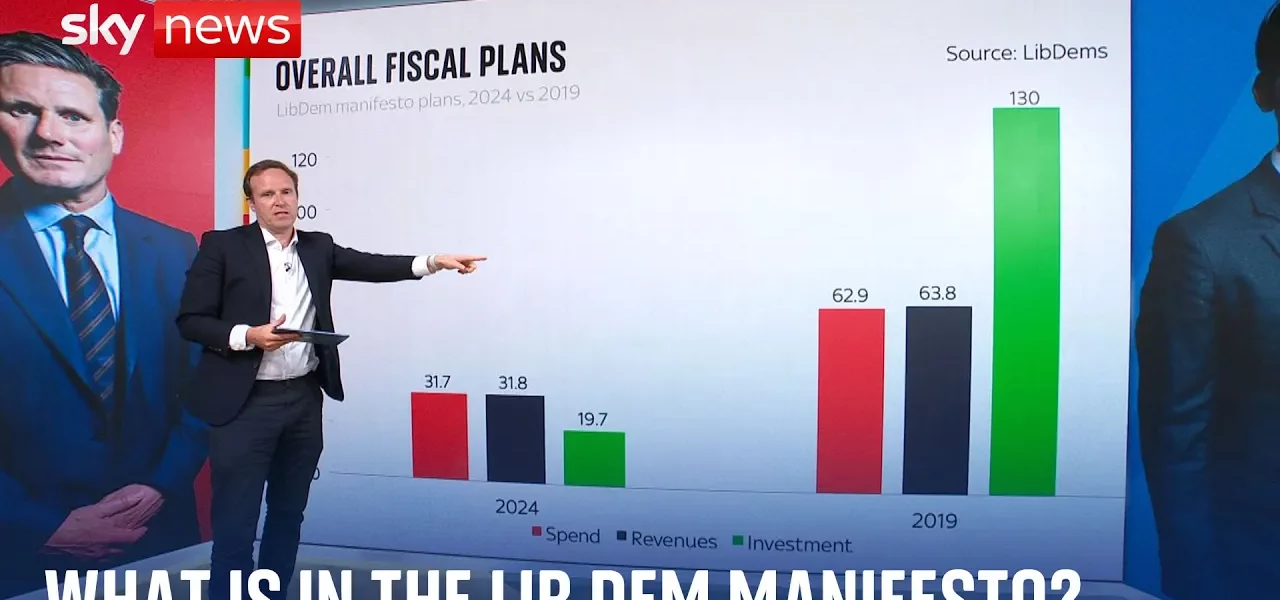In-Depth Analysis of the Liberal Democrats’ Manifesto

This article provides a comprehensive breakdown of the Liberal Democrats’ latest manifesto, focusing on their proposed policies, budgetary allocations, and the party’s financial strategies. We will explore their spending plans, expected revenues, and the broader implications for UK politics as we approach the upcoming elections.
Introduction
The Liberal Democrats (Lib Dems) have recently unveiled their manifesto, offering insights into their potential policies and financial commitments. While the party currently does not anticipate being in government, possibly only participating in a coalition, their proposal has sparked discussions about the feasibility and implications of their plans. This article aims to dissect the manifesto’s key elements, focusing on spending commitments, revenue generation strategies, and the overall context within UK politics.
Overview of Proposed Spending
According to the manifesto, the Liberal Democrats plan to introduce an additional £32 billion in spending, which they suggest will be balanced by an equivalent increase in revenue. A significant portion of this budget is earmarked for public services, particularly the National Health Service (NHS) and social care.
Key Spending Areas
- National Health Service and Social Care: £8.4 billion for enhancing NHS services, which includes funding for more General Practitioners (GPs), cancer research, and guaranteed NHS dentistry.
- Defense: An increase of £6.7 billion, reflecting a commitment to bolster national security.
- International Aid: Restoring aid spending to 0.7% of GDP, aligning with previous commitments.
- Investment Initiatives: An additional £20 billion aimed at stimulating economic growth.
These figures represent a substantial investment in public welfare, although analysts question whether these amounts will suffice given increasing demands on the NHS and social care systems.
Revenue Generation Strategies
To fund their ambitious spending plans, the Liberal Democrats have outlined several revenue generation strategies primarily focused on addressing tax avoidance and evasion.
Taxation Reforms
- Combatting Tax Avoidance: The Lib Dems estimate they can generate £7.2 billion by tackling tax avoidance and ensuring compliance in the tax system.
- Capital Gains Tax Increase: Introducing new tax bands of 20%, 40%, and 45%, aimed at higher earners, particularly the wealthiest 0.1% of the population.
- Super Tax on Private Jets: Aimed at affluent individuals, this tax is part of the party’s broader strategy to ensure that the wealthy contribute fairly to public finances.
- Air Passenger Duty: Expected to raise £3.6 billion, although specifics on the implementation rate remain vague.
Concerns and Considerations
While the manifesto presents a clear fiscal plan, there are concerns regarding the practicality of these revenue generation strategies. The feasibility of collecting the projected amounts, particularly from small businesses and individuals engaged in cash-in-hand practices, is uncertain.
Historical Context and Comparisons
When comparing the current manifesto to previous offerings, particularly the 2019 manifesto led by Jo Swinson, it becomes evident that the Lib Dems’ current fiscal ambitions are more restrained.
Spending and Revenue Trends
The 2019 manifesto proposed double the amount of spending and revenue generation compared to the current proposal. This shift could reflect a more cautious approach in light of the current economic climate, including the ongoing impacts of COVID-19.
Pragmatism vs. Ambition
Many observers view this shift as indicative of a pragmatic response to the economic constraints faced by all major parties, which have committed to fiscal rules limiting future spending. As such, the manifesto may be less ambitious but arguably more realistic.
Brexit and EU Relations
Another significant aspect of the manifesto is its approach to Brexit and the UK’s relationship with the European Union (EU). Historically, the Lib Dems have been staunch advocates for EU membership, but this manifesto reflects a quieter stance on the issue.
Position on EU Membership
The manifesto does not prominently feature Brexit discussions, only mentioning a long-term objective of rejoining the single market located deep within its text. This change signals a strategic pivot, recognizing the sensitivity of the topic among the electorate.
Conclusion
The Liberal Democrats’ manifesto presents a detailed yet cautious approach to UK politics, prioritizing fiscal responsibility alongside commitments to public services. With substantial proposed investments and ambitious revenue generation strategies, the challenge remains in their implementation and public reception. As the election approaches, voters will be keenly observing the viability of these proposals and the party’s overall direction. For more updates on political developments and analysis, explore our related articles.
“`




